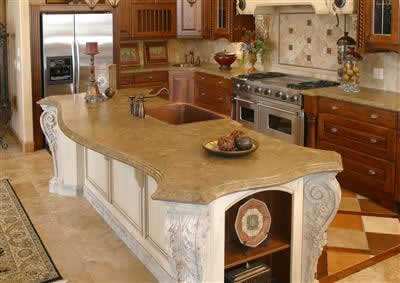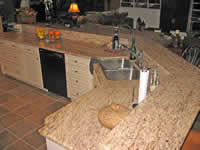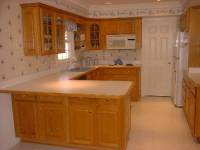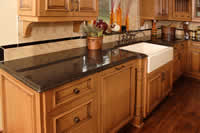If you are considering remodeling a kitchen or bathroom you should remember that the countertop is a major focal point of the room. The countertop can also be a major part of the budget for a bathroom or kitchen home improvement. You have many choices of material, some are diy home handyman oriented and others are not, each has advantages and disadvantages – learn which is best for you!
Concrete:

Figure 1 - Concrete counter top in kitchen
Picture courtesy of Stone Passion
A concrete countertop, as shown in Figure 1, is generally produced by casting them in custom made molds matching the size, shape, and cutouts of the customer’s requirements at the manufacturers premise. The concrete is then allowed to cure and is surface finished. Some manufacturers will actually cast the countertop at the customer’s premise, by building a mold that sits on the base cabinets. This avoids the problems that are encountered in moving a large slab of concrete from the manufacturer’s facilities to the homeowner’s kitchen or bathroom.
As every concrete countertop is custom molded each one is unique.
A concrete countertop allows for a great deal of customization in finish, texture, shape, edging, and color. As an example, a butcher block cutting board can be recessed into the countertop during molding. The variations are endless and are only constrained by your imagination.
Sinks can be installed as under-mount, surface mount or can be molded as an integral part of the countertop.
A cutting board should always be used as the concrete will dull knives instantly and it can scratch.
Maintenance: As concrete is a porous material it should be sealed yearly with a penetrating sealer and waxed every six months. Spills should be cleaned up immediately as some will produce stains if left to sit on the counter. Use a non-abrasive cleaner.
Cost: $75-$200/sq. ft., installed
Granite:

Figure 2 - Granite countertop
Timeless beauty with unique natural stone – that is what a granite countertop will provide! A granite countertop, as shown in Figure 2, is cut to size, and polished at the manufacturers facility and then installed on your base cabinets. Available in a vast number of colors and grains a granite countertop can be purchased to match almost any kitchen or bathroom décor and style.
Sinks can be under-mount or surface mount, and a cutting board should be used to protect the surface as granite can be scratched.
Maintenance. Granite is a very porous material and must be sealed with a penetrating sealer at least twice a year. A non-abrasive liquid detergent with warm water should be used for surface cleaning.
Cost: From $100-$200/lin. ft., installed
Laminate:

Figure 3 - Laminate countertop
Considered by many to be the poor man’s countertop, as shown in Figure 3, laminate has recently developed a following by some top designers. The primary reason is the hundred’s of colors, patterns and textures that are now available, which can be used to enhance the décor and ambience of any room.
Laminate countertops can be ordered preformed with integral back splashes and rolled front edges to prevent liquids from spilling down cabinets and onto floors. Almost any reasonably competent diy handyman or handywoman can create and install a laminate countertop on-site.
Laminate countertops do not lend themselves well to under-mount sink installation hence it is recommended that sinks be surface mounted. Laminate does scratch so a cutting board should be used. Laminate does not stand-up well to high heat, so some sort of protection should be placed under hot pots.
Maintenance: Use a non-abrasive cleaner and rinse to avoid leaving soap residue. Laminate does not require any sealing.
Natural Stone:

Figure 4 - Marble countertop
The most common of the natural stone countertops are granite (identified as a separate item above), marble, soapstone, and Jerusalem stone. Marble is considered the best surface for needing dough and serious bakers will always have a slab of marble in their preparation area. Although natural stones have an elegant, rich appearance, they do not make the best countertop from the standpoint of day-to-day usage. Natural stones stains easily, are soft and there is a tendency for the material to chip.
Sinks can be installed as under-mount or surface mount. A professional should make all cutouts and holes in the material.
Maintenance: Cleaning should be liquid detergent and warm water. Marble and Jerusalem stone should be sealed every year with a penetrating sealer. Soapstone should have mineral oil applied twice a month during the first year and four times a year thereafter.
Cost: From $75-$200/lin. ft., installed
